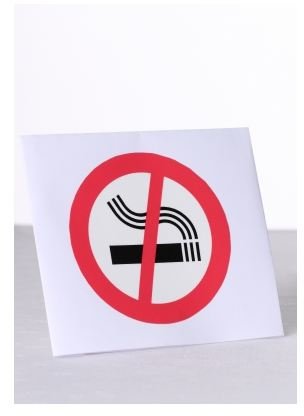A Review of Smoking in the Workplace Laws: What Does Your State Say About Smoking at the Office?
The Basis of Anti-Smoking Regulations
Among the earliest laws that banned smoking was a 1575 Mexican ecclesiastical council order that forbade the use of tobacco in any church in Mexico and Spanish colonies in the Caribbean. Since then, the harmful effects of smoking has resulted in many anti-smoking laws and ordinances in many places of the world.
By the 1980s, research established the negative effects of smoking on health. A 2002 study by the World Health Organization established that non-smokers exposed to second-hand smoke also inhale the same carcinogens that active smokers do. In fact, second hand smoke contains several carcinogens at higher concentrations than in mainstream smoke. Inhaling second hand smoke increases the risk of heart disease, cancer, emphysema, and other diseases, and The Environmental Protection Agency estimates about 3,000 lung cancer deaths and 37,000 heart disease deaths a year owing to inhalation of second-hand smoke.
The World Health Organization now takes the initiative to press for smoke-free workplace laws as an important step toward lowering smoking rates and promoting public health.
Overview of Laws
The United States does not have a federal anti-smoking law, but most of the states have enacted “clean indoor air laws” that forbid or regulate employees from smoking while at work. The first such law in the United States was the 1975 Minnesota Clean Indoor Air Act.
As of April 2011, twenty-seven U.S. states and American Samoa, the District of Columbia, Puerto Rico and the United States Virgin Islands have enacted blanket smoking bans in all general workplaces and public places, including bars and restaurants, but excluding tobacconists, cigar bars, casinos, private clubs, and/or small private workplaces. California, New Jersey, Connecticut, Rhode Island, and Vermont have smoking laws that specifically target the workplace, protecting non-smoking employees from second-hand smoke regardless of their workplace.
The Vermont law, for instance bans smoking inside all enclosed workplace structures, and allows employers to provide smoking rooms only outside the structure. It recommends employers to post 100 percent smoke-free posters. The law encourages employees to complain if employers do not enforce the anti-smoke rules, and forbids retaliation for such complaints. The fine for non-compliance is $100 a day.
Georgia, Idaho, Nevada, New Hampshire, North Carolina, and Virginia have laws that ban smoking in specific places. Most such laws prohibit smoking in public workplaces such as hospitals and restaurants, but allow workers to smoke in private workplaces or in designated rooms or areas. Other states have no state laws that ban smoking in the workplace, but many cities and/or counties have enacted local smoking bans to varying degrees. The only exception is Oklahoma, which does not allow local governments to regulate smoking.
The cities and counties that enacted ordinances against smoking in the workplace do so under the ambit of local criminal and occupational safety and health laws. Forty-seven out of the sixty most populated cities in the United States have enforced some form of smoking ban in workplaces.
Most anti-smoking laws exempt private social functions, offices occupied exclusively by smokers, prisons and correctional or care institutions from the laws, leaving such institutions to adopt their own policies.
As of April 2011, almost half of the workforce have a total ban of smoking in the workforce, and another 30 percent have restrictions on smoking imposed by the state or county.
Company Policies

Even if state or county do not have smoking in the workplace laws, employers remain free to ban smoking at the office. Privacy laws only allow workers to smoke when they are alone, outside the workplace, and case laws have validated the employers’ right to prevent employees from smoking during work hours, regardless of whether they are at the workstation, or outside. The law also does not mandate the employer to provide any “smoking breaks” or any “smoking room” although in states that do not enforce a total ban smoking at work, the employer may provide these facilities at discretion.
Many states forbid employers from making job decisions based on employee’s legal activities outside the workplace. The decision of Wevco, a Michigan based health care company prohibiting workers from smoking, even off the job, and terminating employees who refused to comply in early 2005 became controversial and led to some states incorporating provisions that forbid employers from discriminating against employees for smoking outside work. The employer, for instance cannot refuse to hire, or fire employees because they smoke outside of work, unless such smoking directly restricts work performance.
Regardless of the laws, companies try to regulate or restrict smoking in the workplace as part of a complete health and safety program to promote and safeguard employee health. Anti-smoking laws and policies also allow employers to save on healthcare insurance, unemployment insurance, and worker’s compensation insurance, decrease legal liability, reduce the risk of fire, promote cleanliness, reduce energy use through decreased ventilation needs, save on cleaning charges, and promote an overall healthier work environment. Studies also prove that smoke-free environments increase productivity and improve morale.
The major charge against anti-smoking laws is violation of civil liberties and individual freedom. Smoke-free laws, however, operate under the rationale that smoking is optional and breathing is not, and that one’s man’s freedom does not come at the cost of another man’s right to clean air or at the cost of adverse consequences to another’s health.
References
- “Smoking in the Workplace.” https://www.nolo.com/legal-encyclopedia/smoking-workplace-29755.html. Retrieved 23 June 2011.
- Christopher Carpenter. “The Effects of Local Workplace Smoking Laws on Smoking Restrictions and Exposure to Smoke at Work.” https://web.gsm.uci.edu/~kittc/CarpenterCanadaSmokingBans-05%202008.pdf. Retrieved 23 June 2011.
- “Smoking is Expensive Business.” https://www.law.capital.edu/tobacco/workplace/costs_smoking.html. Retrieved 23 June 2011.
Image Credits:
